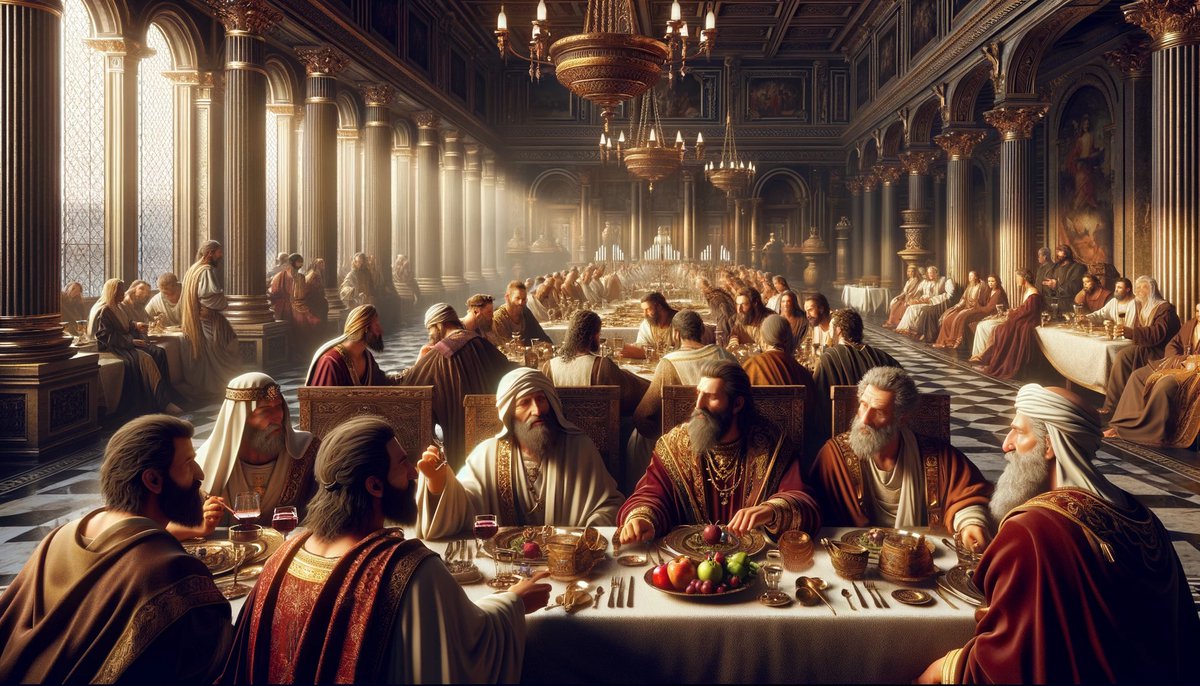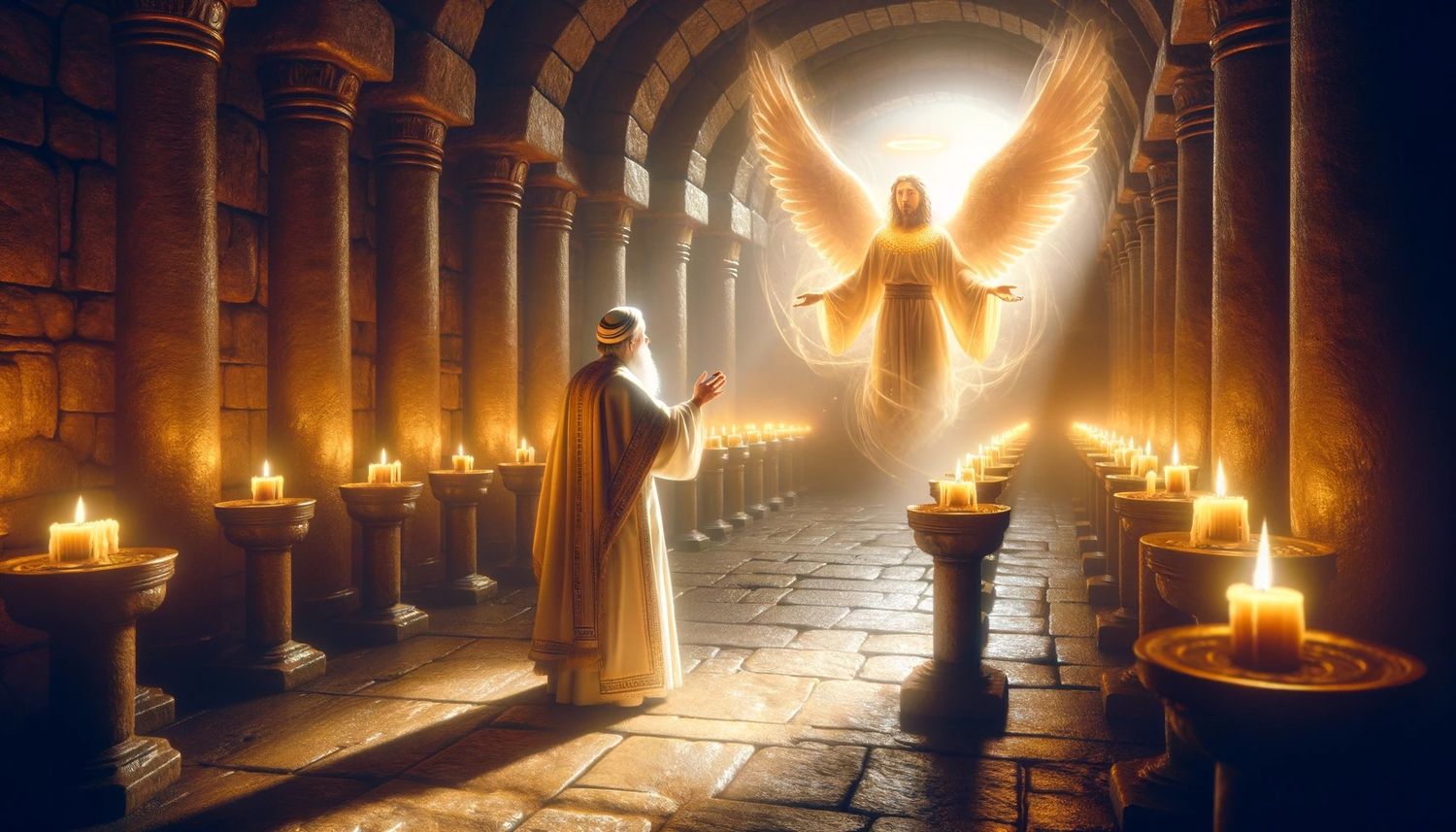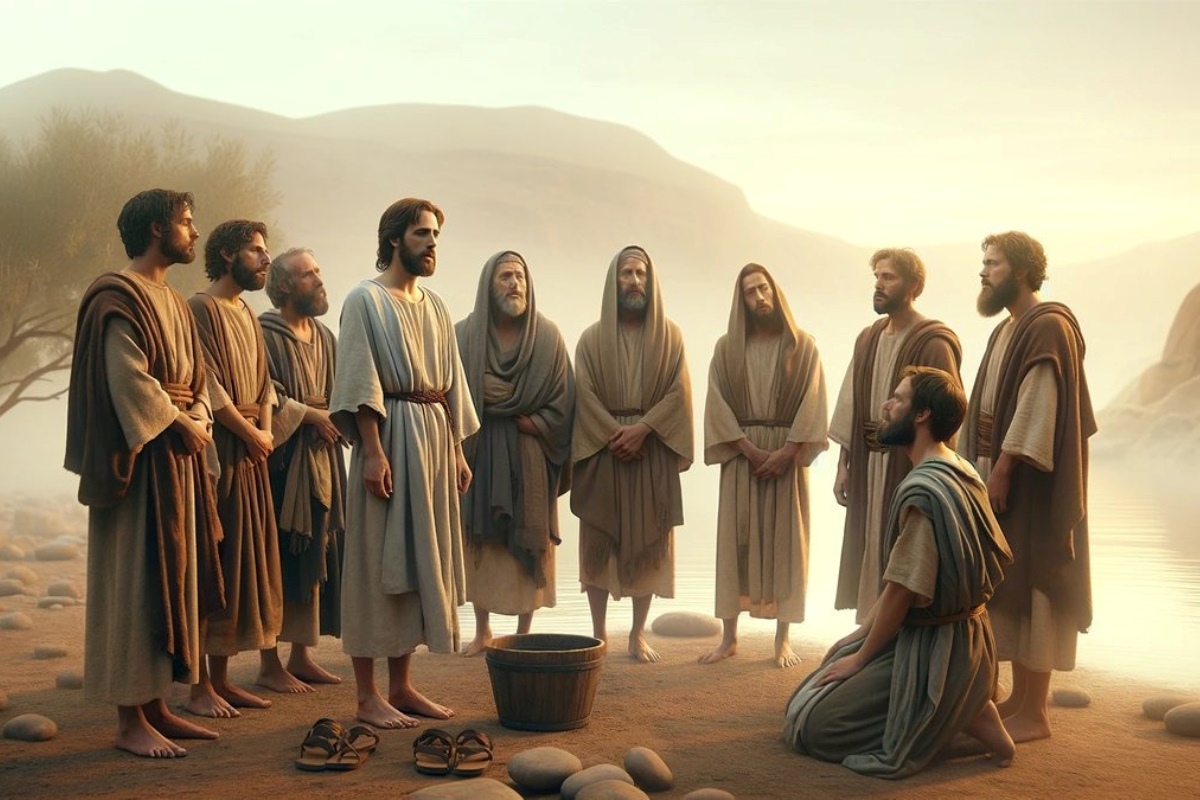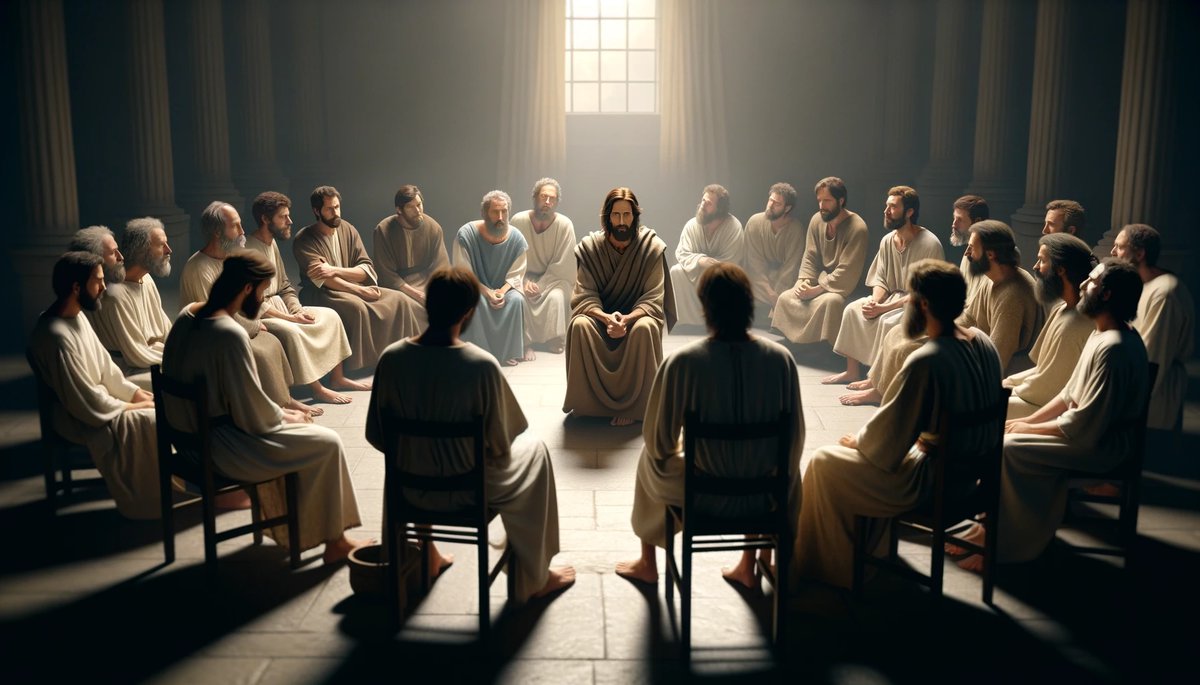Home>Theology and Spirituality>Who Asked For The Head Of John The Baptist On A Platter


Theology and Spirituality
Who Asked For The Head Of John The Baptist On A Platter
Published: February 23, 2024
Peter Smith, Editorial Director at Christian.net, combines deep insights into faith, politics, and culture to lead content creation that resonates widely. Awarded for his contributions to religious discourse, he previously headed a major organization for religious communicators, enhancing dialogue on faith's societal impacts.
Discover the historical and theological significance of the request for John the Baptist's head on a platter in this insightful exploration of theology and spirituality.
(Many of the links in this article redirect to a specific reviewed product. Your purchase of these products through affiliate links helps to generate commission for Christian.net, at no extra cost. Learn more)
Table of Contents
Introduction
The story of John the Baptist is a compelling and poignant narrative that has captivated the hearts and minds of people for centuries. It is a tale of unwavering faith, political intrigue, and the clash between righteousness and worldly power. At the center of this gripping account is the chilling request for the head of John the Baptist on a platter—a demand that reverberates with profound symbolism and significance.
The events leading up to this request are shrouded in drama and moral complexity, making it a pivotal moment in the biblical narrative. Understanding the context and implications of this request requires delving into the life and mission of John the Baptist, a revered figure whose legacy continues to inspire and challenge believers around the world.
As we embark on this exploration, we will unravel the layers of this timeless story, seeking to grasp its deeper meanings and relevance to our lives today. The request for John's head on a platter serves as a haunting reminder of the clash between truth and power, and the enduring legacy of those who fearlessly uphold their convictions in the face of adversity.
Read more: Who Asked For Head Of John Baptist
The Story of John the Baptist
John the Baptist, a central figure in the New Testament, was a prophet and preacher who emerged in the wilderness of Judea, proclaiming a message of repentance and preparing the way for the coming of the Messiah. His unconventional appearance, clad in camel's hair with a leather belt around his waist, and his diet of locusts and wild honey, set him apart as a striking and enigmatic figure.
The son of Zechariah, a priest, and Elizabeth, a relative of Mary, the mother of Jesus, John's miraculous birth was foretold by an angel. From his early days, he was destined for a divine purpose, as he would go on to fulfill the prophecy of Isaiah, becoming the voice crying out in the wilderness, "Prepare the way of the Lord, make his paths straight."
John's ministry was characterized by a fervent call to repentance and baptism, urging people to turn away from their sins and be cleansed in preparation for the imminent arrival of the Messiah. Multitudes flocked to the Jordan River to heed his message, and his influence reverberated throughout the region.
His unwavering commitment to truth and righteousness brought him into direct confrontation with the religious authorities of the time, as he fearlessly denounced hypocrisy and called for genuine spiritual transformation. Even the powerful and influential were not spared from his scathing rebukes, as he fearlessly challenged them to live lives of integrity and justice.
John's pivotal role in preparing the way for Jesus culminated in the iconic moment when he baptized Jesus in the Jordan River, bearing witness to the divine affirmation of Jesus as the Son of God. This profound encounter marked a significant turning point in the unfolding drama of salvation history.
The story of John the Baptist is one of courage, conviction, and unwavering dedication to his divine calling. His uncompromising stance in the face of opposition and his unyielding commitment to his mission continue to inspire and challenge believers to this day. The request for his head on a platter stands as a stark reminder of the high price that prophets and truth-bearers often pay for their unwavering fidelity to their calling.
The Request for John's Head
The request for John the Baptist's head on a platter is a harrowing and tragic episode in the biblical narrative, steeped in political intrigue and moral depravity. The catalyst for this chilling demand was a fateful banquet hosted by King Herod Antipas, the ruler of Galilee and Perea. During the lavish feast, Herodias, the wife of Herod's brother, danced before the king and his guests, captivating them with her performance. Impressed by her display, Herod made a rash and ill-fated promise, offering to grant her any request, up to half of his kingdom.
Seizing this opportune moment, Herodias, driven by a deep-seated vendetta against John the Baptist, instructed her daughter to ask for the head of John on a platter. Herod, torn between his regard for John and the weight of his impulsive vow, found himself ensnared in a web of conflicting loyalties and moral dilemmas. Despite his inner turmoil, Herod succumbed to the pressure of upholding his oath and ordered the execution of John the Baptist.
The request for John's head on a platter is a chilling testament to the corrosive influence of pride, vanity, and vindictiveness. It exposes the depths of human depravity and the tragic consequences of succumbing to the whims of power and ego. Moreover, it serves as a stark reminder of the clash between divine truth and the capriciousness of earthly authority.
This haunting episode underscores the timeless struggle between righteousness and the corrupting forces of the world. John the Baptist's unwavering commitment to proclaiming the truth and confronting moral decay stood in stark contrast to the moral compromise and political expediency that led to his demise. His martyrdom serves as a poignant symbol of the enduring conflict between the prophetic voice of conscience and the oppressive forces that seek to silence it.
The request for John's head on a platter stands as a sobering reminder of the high cost of fidelity to one's convictions and the enduring legacy of those who refuse to yield to the pressures of expediency and compromise. It challenges us to reflect on the timeless relevance of this tragic event and its implications for our own lives, urging us to uphold the principles of justice, integrity, and unwavering commitment to truth, even in the face of formidable opposition.
The Significance of the Head on a Platter
The request for John the Baptist's head on a platter holds profound significance, transcending its macabre and tragic nature. It serves as a haunting symbol of the collision between divine truth and the corrupting influence of worldly power. The image of John's severed head presented on a platter encapsulates a potent narrative that resonates with timeless themes and enduring relevance.
First and foremost, the head on a platter represents the ultimate price paid for unwavering fidelity to truth and righteousness. John the Baptist's martyrdom stands as a stark reminder of the sacrifices made by those who dare to confront moral decay and challenge the status quo. His beheading, a consequence of his unyielding commitment to his prophetic calling, embodies the profound cost of bearing witness to divine truth in a world rife with moral compromise and injustice.
Moreover, the request for John's head on a platter underscores the clash between spiritual integrity and the capriciousness of earthly authority. It lays bare the tragic consequences of succumbing to the whims of power and ego, as evidenced by Herod's fateful decision driven by pride and moral vacillation. The juxtaposition of the sacredness of John's prophetic mission with the callousness of political expediency serves as a poignant commentary on the perennial struggle between the demands of conscience and the allure of temporal power.
Furthermore, the head on a platter embodies the enduring legacy of prophetic voices that refuse to be silenced. Despite the brutality of John's demise, his unwavering commitment to truth reverberates through the annals of history, inspiring generations to uphold the principles of justice, integrity, and moral courage. The image of his severed head serves as a timeless emblem of the indomitable spirit of those who fearlessly bear witness to divine truth, even in the face of formidable opposition and persecution.
In essence, the significance of the head on a platter transcends its gruesome portrayal, encapsulating a narrative of profound moral and spiritual import. It stands as a stark reminder of the enduring struggle between righteousness and the corrupting forces of the world, urging us to heed the timeless lessons embedded within this tragic episode. The request for John's head on a platter challenges us to reflect on the enduring relevance of his legacy and the imperative of upholding unwavering commitment to truth and justice, even in the face of daunting adversity.
The Aftermath of John's Death
The beheading of John the Baptist sent shockwaves through the region, eliciting a profound sense of grief and outrage among his followers and those who revered him as a prophetic voice. The news of his brutal demise reverberated far and wide, igniting a fervent outcry against the injustice and moral depravity that led to his untimely end.
In the immediate aftermath of John's death, his disciples and supporters grappled with the profound loss of their revered leader. Their grief was compounded by a deep sense of indignation at the flagrant abuse of power and the wanton disregard for justice that characterized the events leading to John's execution. The martyrdom of John the Baptist galvanized a fervent outcry for accountability and righteousness, as his followers sought to honor his memory by continuing his legacy of unwavering commitment to truth and moral integrity.
Furthermore, the aftermath of John's death served as a sobering reminder of the enduring impact of his prophetic ministry. His uncompromising message of repentance and spiritual renewal continued to resonate in the hearts of those who had heeded his call, inspiring them to persevere in the face of adversity and persecution. The memory of John's unwavering dedication to his divine mission fueled a burgeoning movement of spiritual fervor and moral courage, as his followers sought to emulate his steadfast commitment to righteousness and justice.
Moreover, the aftermath of John's death precipitated a profound reckoning with the moral fabric of society. His martyrdom laid bare the pervasive moral decay and ethical compromise that plagued the corridors of power, prompting a collective soul-searching among those who were confronted with the stark reality of the consequences of unchecked ambition and moral bankruptcy. The tragic fate of John the Baptist served as a catalyst for introspection and a renewed commitment to upholding the principles of justice, integrity, and unwavering fidelity to truth.
In essence, the aftermath of John's death reverberated with a resounding call to honor his legacy by continuing the uncompromising pursuit of righteousness and moral courage. His martyrdom galvanized a movement of spiritual renewal and moral awakening, compelling his followers to confront the pervasive forces of moral decay and injustice. The enduring impact of John's prophetic ministry transcended his tragic demise, igniting a flame of unwavering commitment to truth and justice that would endure for generations to come.
Read more: Who Wanted The Head Of John The Baptist
Conclusion
The request for John the Baptist's head on a platter stands as a haunting testament to the enduring clash between divine truth and the corrupting influence of worldly power. It encapsulates a narrative of unwavering commitment to righteousness, the tragic consequences of moral compromise, and the enduring legacy of prophetic voices that refuse to be silenced. The significance of this chilling demand reverberates through the annals of history, compelling us to confront timeless truths and enduring moral imperatives.
The story of John the Baptist, from his prophetic ministry to his tragic demise, serves as a poignant reminder of the high cost of bearing witness to truth and justice in a world fraught with moral decay and ethical compromise. His unwavering dedication to his divine calling and his steadfast commitment to confronting moral depravity stand as timeless exemplars of moral courage and spiritual integrity.
Moreover, the request for John's head on a platter challenges us to reflect on the enduring relevance of his legacy and the imperative of upholding unwavering commitment to truth and justice, even in the face of daunting adversity. It beckons us to heed the timeless lessons embedded within this tragic episode, inspiring us to emulate John's unwavering fidelity to his prophetic mission and his unyielding commitment to righteousness.
In essence, the request for John the Baptist's head on a platter serves as a sobering reminder of the enduring struggle between righteousness and the corrupting forces of the world. It urges us to honor the legacy of those who fearlessly bear witness to divine truth, even in the face of formidable opposition and persecution. The haunting image of John's severed head calls upon us to uphold the principles of justice, integrity, and unwavering commitment to truth, echoing through the corridors of history as an enduring testament to the indomitable spirit of those who refuse to be silenced in the face of moral decay and injustice.














